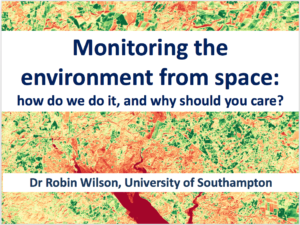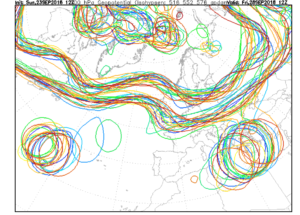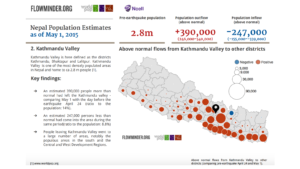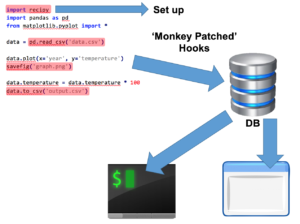I give talks – on science, programming and more
The quick summary of this post is: I give talks. You might like them. Here are some details of talks I’ve done. Feel free to invite me to speak to your group – contact me at robin@rtwilson.com. Read on for more details.
I enjoy giving talks on a variety of subjects to a range of groups. I’ve mentioned some of my programming talks on my blog before, but I haven’t mentioned anything about my other talks so far. I’ve spoken at amateur science groups (Cafe Scientifique or U3A science groups and similar), programming conferences (EuroSciPy, PyCon UK etc), schools (mostly to sixth form students), unconferences (including short talks made up on the day) and at academic conferences.
Feedback from audiences has been very good. I’ve won the ‘best talk’ prize at a number of events including the Computational Modelling Group at the University of Southampton, the Student Conference on Complexity Science, and EuroSciPy. A local science group recently wrote:
"The presentation that Dr Robin Wilson gave on Complex systems in the world around us to our Science group was excellent. The clever animated video clips, accompanied by a clear vocal description gave an easily understood picture of the underlining principles involved. The wide range of topics taken from situations familiar to everyone made the examples pertinent to all present and maintained their interest throughout. A thoroughly enjoyable and thought provoking talk."
A list of talks I’ve done, with a brief summary for each talk, is at the end of this post. I would be happy to present any of these talks at your event – whether that is a science group, a school Geography class, a programming meet-up or something else appropriate. Just get in touch on robin@rtwilson.com.
Science talks
All of these are illustrated with lots of images and videos – and one even has live demonstrations of complex system models. They’re designed for people with an interest in science, but they don’t assume any specific knowledge – everything you need is covered from the ground up.
Monitoring the environment from space
Hundreds of satellites orbit the Earth every day, collecting data that is used for monitoring almost all aspects of the environment. This talk will introduce to you the world of satellite imaging, take you beyond the ‘pretty pictures’ to the scientific data behind them, and show you how the data can be applied to monitor plant growth, air pollution and more. 
From segregation to sand dunes: complex systems in the world around us
‘Complex’ systems are all around us, and are often difficult to understand and control. In this talk you will be introduced to a range of complex systems including segregation in cities, sand dune development, traffic jams, weather forecasting, the cold war and more – and will show how looking at these systems in a decentralised way can be useful in understanding and controlling them. I’m also working on a talk for a local science and technology group on railway signalling, which should be fascinating. I’m happy to come up with new talks in areas that I know a lot about – just ask.
Programming talks
These are illustrated with code examples, and can be made suitable for a range of events including local programming meet-ups, conferences, keynotes, schools and more.
Writing Python to process millions of row of mobile data – in a weekend
In April 2105 there was a devastating earthquake in Nepal, killing thousands and displacing hundreds of thousands more. Robin Wilson was working for the Flowminder Foundation at the time, and was given the task of processing millions of rows of mobile phone call records to try and extract useful information on population displacement due to the disaster. The aid agencies wanted this information as quickly as possible, so he was given the unenviable task of trying to produce preliminary outputs in one bank-holiday weekend! This talk is the story of how he wrote code in Python to do this, and what can be learnt from his experience. Along the way he’ll show how Python enables rapid development, introduce some lesser-used built-in data structures, explain how strings and dictionaries work, and show a slightly different approach to data processing.
xarray: the power of pandas for multidimensional arrays
"I wish there was a way to easily manipulate this huge multi-dimensional array in Python…", I thought, as I stared at a huge chunk of satellite data on my laptop. The data was from a satellite measuring air quality – and I wanted to slice and dice the data in some supposedly simple ways. Using pure numpy was just such a pain. What I wished for was something like pandas – with datetime indexes, fancy ways of selecting subsets, group-by operations and so on – but something that would work with my huge multi-dimensional array.
The solution: xarray – a wonderful library which provides the power of pandas for multi-dimensional data. In this talk I will introduce the xarray library by showing how just a few lines of code can answer questions about my data that would take a lot of complex code to answer with pure numpy – questions like ‘What is the average air quality in March?’, ‘What is the time series of air quality in Southampton?’ and ‘What is the seasonal average air quality for each census output area?’.
After demonstrating how these questions can be answered easily with xarray, I will introduce the fundamental xarray data types, and show how indexes can be added to raw arrays to fully utilise the power of xarray. I will discuss how to get data in and out of xarray, and how xarray can use dask for high-performance data processing on multiple cores, or distributed across multiple machines. Finally I will leave you with a taster of some of the advanced features of xarray – including seamless access to data via the internet using OpenDAP, complex apply functions, and xarray extension libraries.
 recipy: effortless provenance in Python
recipy: effortless provenance in Python
Imagine the situation: You’ve written some wonderful Python code which produces a beautiful output: a graph, some wonderful data, a lovely musical composition, or whatever. You save that output, naturally enough, as awesome_output.png. You run the code a couple of times, each time making minor modifications. You come back to it the next week/month/year. Do you know how you created that output? What input data? What version of your code? If you’re anything like me then the answer will often, frustratingly, be "no".
This talk will introduce recipy, a Python module that will save you from this situation! With the addition of a single line of code to the top of your Python files, recipy will log each run of your code to a database, keeping track of all of your input files, output files and the code that was used – as well as a lot of other useful information. You can then query this easily and find out exactly how that output was created.
In this talk you will hear how to install and use recipy and how it will help you, how it hooks into Python and how you can help with further development.
School talks/lessons
Decentralised systems, complexity theory, self-organisation and more
This talk/lesson is very similar to my complex systems talk described above, but is altered to make it more suitable for use in schools. So far I have run this as a lesson in the International Baccalaureate Theory of Knowledge (TOK) course, but it would also be suitable for A-Level students studying a wide range of subjects.
GIS/Remote sensing for geographers
I’ve run a number of lessons for sixth form geographers introducing them to the basics of GIS and remote sensing. These topics are often included in the curriculum for A-Level or equivalent qualifications, but it’s often difficult to teach them without help from outside experts. In this lesson I provide an easily-understood introduction to GIS and remote sensing, taking the students from no knowledge at all to a basic understanding of the methods involved, and then run a discussion session looking at potential uses of GIS/RS in topics they have recently covered. This discussion session really helps the content stick in their minds and relates it to the rest of their course.
Computing
As an experienced programmer, and someone with formal computer science education, I have provided input to a range of computing lessons at sixth-form level. This has included short talks and part-lessons covering various programming topics, including examples of ‘programming in the real world’ and discussions on structuring code for larger projects. Recently I have provided one-on-one support to A-Level students on their coursework projects, including guidance on code structure, object-oriented design, documentation and GUI/backend interfaces.
If you found this post useful, please consider buying me a coffee.
This post originally appeared on Robin's Blog.
Categorised as: Academic, GIS, Programming, Python, Remote Sensing, TOK-related



Really fantastic your post, thank you for the content.
My name is Toti Cavalcanti, i am a musician and computer scientist from Rio de Janeiro Brazil.
I have a blog in portuguese about C, python, R, Javascript and some data science content, hadoop ecosystem, etc.
Congratulations, i really like so much this post.
\o/ 😉